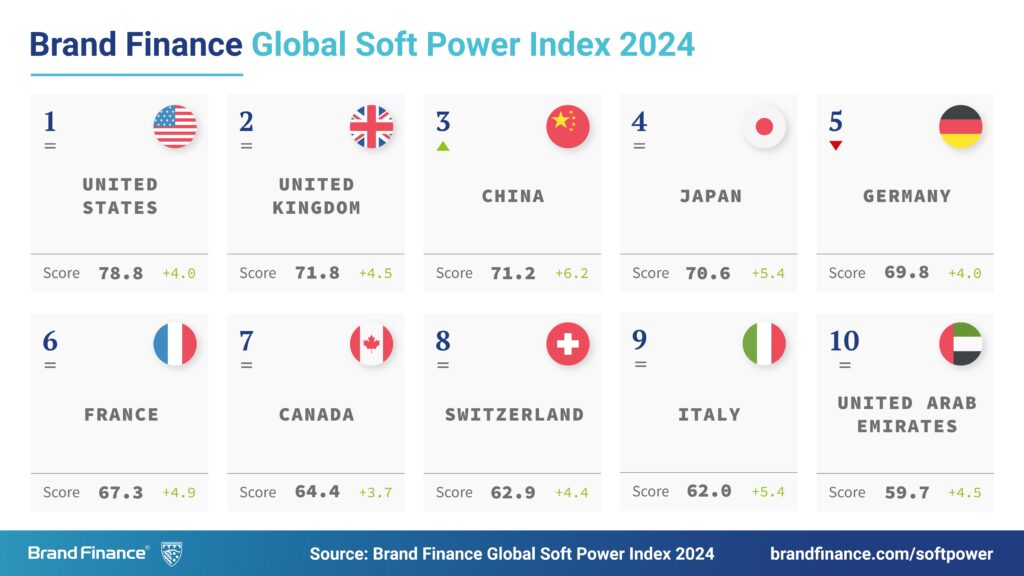
Monday May 13, 2024
UK Soft Power: the UK ranks second in soft power, but could it lose its position soon?
This is where the concept of ‘soft power’ comes into play, a term coined by Joseph Nye in the 1980s. It refers to a nation’s ability to achieve its objectives through attraction and persuasion rather than coercion. According to Nye, the various forms of soft power are necessary because “If a state can make its power seem legitimate in the eyes of others, it will encounter less resistance to its wishes.” In some ways, it is simply PR on a bigger scale.
Earlier this year, Brand Finance released its annual Global Soft Power Index 2024, ranking the United Kingdom as the second most powerful country in soft power, only falling a step behind the United States by seven points. In this blog, we will delve into the intricacies of soft power and examine the UK’s current standing.

Image: Brand Finance
What are the drivers of soft power?
There are a multitude of ways in which countries can build their soft power. According to Arthur Peterson, Professor of Science, Technology and Public Policy at UCL, “Higher education has been a source of soft power since the Middle Ages.” He further explains that, through the exchange of students, an attractive image of the host country can be generated — allowing the host nation to acquire a certain amount of power that can be leveraged to achieve desired outcomes.
Popular culture is also an excellent example of soft power. Hollywood, a district of Los Angeles long associated with the American film industry that produces blockbuster films with a global reach, can be used to broadcast American values and geopolitical stances worldwide.
The same can be said for the UK, which has prominent and reliable world-class media outlets with an outsized reach, such as The BBC, Sky News, and many more.
International relations and foreign policy are also vital soft power tools, as governments could assist other countries of strategic importance to advance their interests. For example, The British Council’s Value of Trust report, which polled over 19,000 people worldwide, found that the “perception of the UK as a contributor of overseas development aid was the biggest factor driving trust in the UK government.”
In short, anything a country does or possesses that can influence the preferences or perceptions of other nations through appeal and attraction can fall under soft power. Brand Finance’s index measures a broad range of factors: business and trade, governance, culture and heritage, sustainability, people and values, education and science, international relations, and media and communications.
To learn more about soft power, read our previous blog: What is soft power?
The UK’s soft power: Strong or diminishing?
In early April, the Conservative Party tweeted on X, “Don’t let the doomsters and the naysayers trick you into talking down our country. The UK is strong as ever.” The now-deleted tweet was accompanied by an image of Rishi Sunak, King Charles, an Aston Martin, an aircraft, a football team, and other things presumably British.
However, the aircraft was from the US, and the Aston Martin was Canadian, which are a few things that do not fall under the UK’s soft power.
Regardless, the Tories are clearly confident in the UK’s power. However, while the UK currently ranks second in terms of soft power, how resilient will the country be in maintaining its position? After all, China is ranked third, with its soft power index only 0.6 points lower than the UK. Could it potentially catch up to the UK?
A 2021 review by King’s College London on the UK’s soft power stated that governments could “work much harder to influence the environment in which other non-governmental institutions of soft power — the education, sports and entertainment industries, for example — normally operate.”
However, they found that very few indicators exist that exhibited the government’s intention to take a practical grip on the factors that primarily influence the UK’s strong but potentially waning soft power attributes. Ultimately, even if the UK’s soft power does not necessarily decrease, inaction will result in the UK losing out to other countries that are constantly undertaking measures to improve their influence.
On the other hand, one of the main factors that have created massive uncertainties regarding the UK’s soft power is Brexit, which has been discussed in the news throughout the past few years. In 2016, a Financial Times article read, “…a risk exists that the UK’s considerable soft-power clout would be significantly diminished should it vote to leave the EU.”
As we all know, the UK proceeded with Brexit and officially left the EU on January 31, 2020. In 2023, The Times reported, “British companies are losing faith in the potential benefits of new free trade deals, government research shows, as exporters say Brexit has done more harm than good to their overseas sales.”
Moreover, David Miliband, former Foreign Secretary, recently stated that the UK has lost influence since Brexit. He states that while the UK’s relations with NATO are strong, they are almost nonexistent with the EU. Meanwhile, the EU and NATO have become much closer since the war in Ukraine.
How can the UK cement its soft power attributes?
David Miliband proposes that the UK work closer with the EU, reversing the previous decision in 2019 that refused a political and foreign policy relationship with the EU. Thus, the UK should look into creating policies regarding Russia and China that are better aligned with the EU to drive cooperation and coordination. His recommendation goes far further than any policy outlined by the Labour Party concerning working closely with the EU.
The renowned British think tank Chatham House shares a sentiment similar to David Miliband’s, having stated: “The UK cannot formally join EU efforts, but if it wants to expand its leading role and improve coordination, it will have to invest in making them work.”
However, as previously discussed, there are many components of soft power to consider outside of foreign policy. Last year, the University of Edinburgh published a report assessing how the UK can build a solid framework to enhance its soft power more broadly, including the non-governmental institutions of soft power.
A recommendation they proposed was to establish a new Government-soft power engagement forum. Such a forum provides a crucial connection between the soft power sector and the Government. It will allow for the establishment of a regular feedback loop to give the UK government a wealth of insight to create a long-term strategic plan and strengthen the presence of the soft power sectors.
Curzon PR is a London-based PR firm working with clients globally. If you have any questions, please feel free to contact our Business Development Team bd@curzonpr.com





Follow us